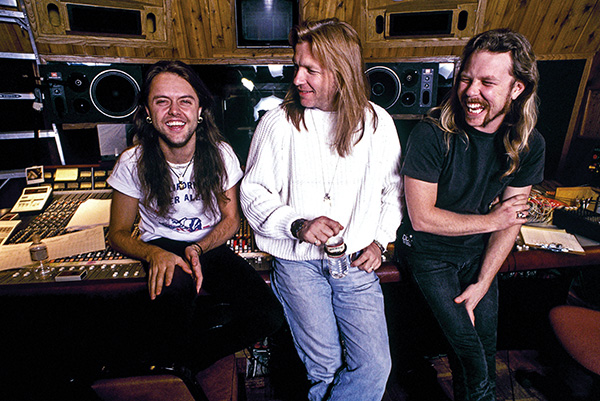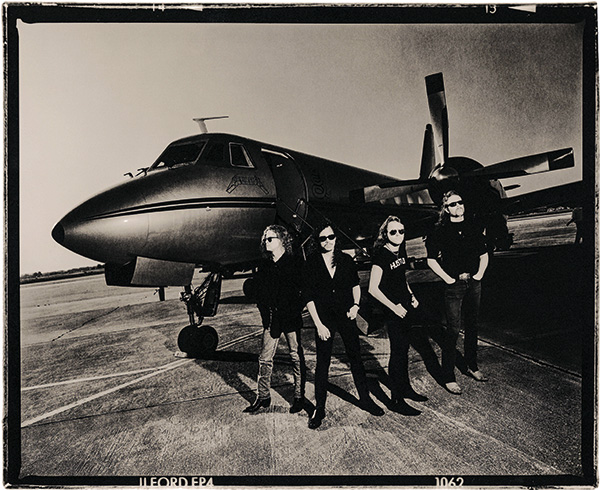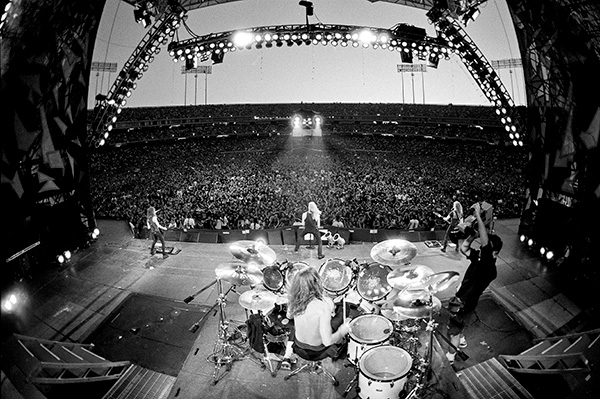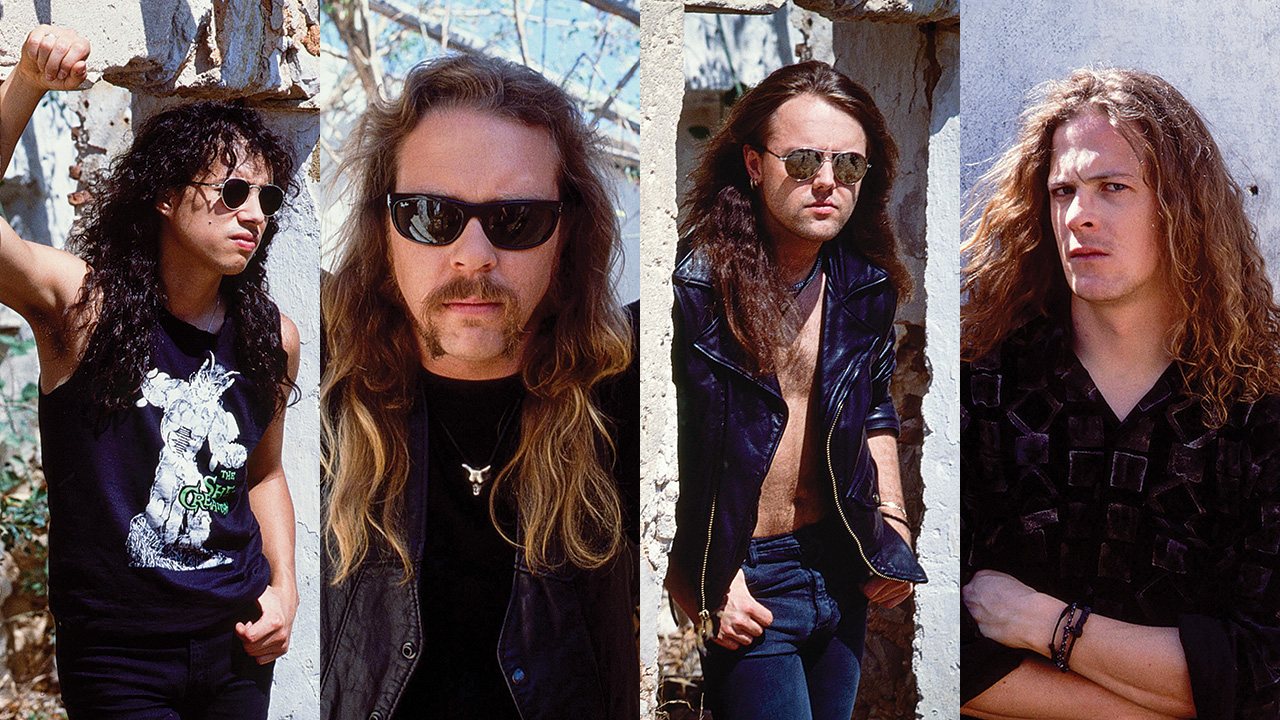Lars Ulrich once neatly encapsulated Metallica’s ambitions for their self-titled fifth album.
“The idea,” the drummer said of the record that would come to be known as the Black Album, “was to cram Metallica down everybody’s fucking throat all over the fucking world.”
That mission was accomplished a long time ago. Thirty years and thirty million sales after its release, this 12-track juggernaut stands not just as Metallica’s most famous album, but also as a massive cultural landmark – one that forced the mainstream to take metal seriously while helping keep its flickering flame alight during the grunge onslaught of the early 90s.
So huge and immediate was its impact at the time, that it began to exert its own gravitational pull, instantly warping the entire metal scene around it. The Black Album did as much to kill off the hair-metal movement as Nirvana or Pearl Jam did; next to its tracks Enter Sandman and Sad But True, dudes in tight leather pants flicking their hair around suddenly looked as ridiculous as we’d known they were all along.
Even the thrash scene that Metallica themselves helped create was sucked into its black hole, their contemporaries aware that the artistic and commercial bar had been set too high for them to ever match.
The effect the album had on Metallica themselves was no less game-changing. Beyond elevating them to music’s A-list, with all the financial rewards that entailed, the Black Album’s inescapable presence forced mainstream culture to take the band that made it seriously – even if it never truly understood them.
More importantly, it set Metallica on the path to where they are today – a band equally comfortable collaborating with Lady Gaga, Lemmy or the San Francisco Symphony Orchestra; one just as at home headlining Glastonbury as Download. Without the Black Album, they would have remained just another metal band. Instead it gave Metallica permission to be bigger than themselves.
“It gave us carte blanche to be whatever we wanted to be, and to go wherever we wanted to go,” James Hetfield says today. The Black Album’s legacy is brought home by an exhaustive new reissue. As well collecting together the countless early demos and rehearsal tapes, it’s accompanied by The Metallica Blacklist, a 53-track all-star covers album comprising versions of Black Album songs by everyone from Ghost, Volbeat and Biffy Clyro to Miley Cyrus, Depeche Mode’s Dave Gahan and modern country icon Chris Stapleton.
“It’s a cultural force in itself,” guitarist Kirk Hammett says of the Black Album. “As much as modern culture changes and morphs, there’s something within that album that continues to resonate around the world. And I mean the world, because it’s big everywhere.”
The Black Album didn’t appear out of nowhere. It was a product of hard graft and epic tension, nine months in the making and deeply ingrained in the memories of the people involved. What follows is the story of how Metallica created the album that changed metal forever.

Metallica were one of the surprise success stories of the 1980s. Few took them seriously when they released their debut album Kill ’Em All, but their profile and credibility jumped significantly with each successive release.
1988’s …And Justice For All sold two million copies, but the band knew its knotty, progmetal-adjacent sound was a barrier to the proper crossover success they craved. Their fifth album would be a reaction to many things, but mostly it was a reaction to Metallica themselves.
Lars Ulrich: We spent a lot of years trying to prove to ourselves and to everyone out there that we can play our instruments. You know: “Listen to this big drum fill I’m doing, and Kirk’s playing all these wild things that are really difficult…”
Kirk Hammett: …And Justice For All really opened our eyes to how progressive we could be and how much we demanded from our audience.
Ulrich: About halfway through the Justice tour, I was sitting there playing these nine-minute songs, thinking: “Why am I worrying about how perfect these nine-minute songs have to be, when we play stuff like Seek And Destroy or For Whom The Bell Tolls and it has a great fucking vibe?’
Hammett: When we played the song …And Justice For All live on that tour, I saw people literally yawning, checking their watches. They were just, like: [bored shrug] “Oh, okay.”
Hetfield: With Justice we had gone as far as we could with the complexity and the showmanship.
Hammett: When it came to the next album, we didn’t want to go down the same progressive, demanding route. We had our sights set on bigger things. You have to remember that there had been some mega albums around that time – Bon Jovi, Def Leppard, Bruce Springsteen… eight million, nine million copies sold. And we wanted that. It’s obvious. We wanted a Back In Black.
In the summer of 1990, Metallica began writing the follow-up to …And Justice For All. Hammett and Hetfield had a bunch of sketches and ideas spread across a dozen C60 and C90 cassettes they called ‘The Riff Tapes’. They gave themselves one overriding instruction: keep things simple.
Ulrich: I used to be really concerned with the timing and lengths of a song when we were writing them. But this time I didn’t even want to think about it.
Hetfield: A lot of the songs that I enjoyed covering or writing on, like, Kill ’Em All, they were a lot shorter, a little more simplistic.
Hammett: We had a lot of those riffs even before we started recording. The Sad But True riff, that had been hanging out for a while. Of Wolf And Man riff, Through The Never – that main riff was hanging out.
Ulrich: There was something about this record, even from the days that we started writing Enter Sandman – that sounded like a motherfucker.
Hammett: The Enter Sandman riff was a riff that just fucking appeared. It was three o’clock in the morning, I was sitting in my bedroom. People say: “What were you doing up at three o’clock in the morning?” Well, I was still in tour mode. I was playing my guitar, I had nothing else to do. I
I'd been listening to Soundgarden all day. They were a band that me and James loved. I was just trying to capture that feel. That riff came out of nowhere. The best parts of that album kind of just wrote themselves. Solos and music and songs feltlike they just appeared out of nowhere. It was like the universe handed it to us on a platter. Not like the first four albums.
The universe might have been dishing out inspiration, but Metallica needed help getting it on to tape. Their previous three albums had been produced by Flemming Rasmussen alongside Hetfield and Ulrich, but the band were aware that for the next one they needed someone to come in and shake things up.
Two albums released in 1989 had impressed them: Sonic Temple by The Cult, and Mötley Crüe’s beefy yet polished 1989 album Dr. Feelgood. Both were produced by Canadian hotshot Bob Rock, a man who would ultimately be inducted into Metallica’s inner circle – although not before a trial of endurance on both sides.
Hetfield: After listening to the Justice album, it was pretty apparent that we needed some guidance. I’m not knocking it. It was right at the time. But the drums are really loud and the guitars are really loud. That’ll be me and Lars, then.
Ulrich: We felt it was time to make a record with a huge, big, fat low end. And the best-sounding record like that in the last couple of years was [Mötley Crüe’s] Dr. Feelgood. So we told our manager: “Call this guy and see if he wants to mix the record.”
Bob Rock (Black Album producer): I hear they want me to mix their new album. I said: “I don’t want to mix your album, but I’ll produce it.” Somebody told me they were put off by that. Evidently not.
Ulrich: Peter [Mensch, Metallica manager] called up and said: “He wants to produce you, too.” I’m like: “Yeah, sure. We’re Metallica, nobody produces us, nobody tells us what to do.” And then after a while we kinda got the guard down a little bit and said: “Well, maybe we should go hang with this guy.”
Rock: They had broken through to one level, but they still weren’t on mainstream radio. When they came to me they were ready to make that leap to the big, big leagues.
Ulrich: He was brutally honest with us. He said he’d seen us play a bunch of times and: “You guys have not captured what’s live on record yet.” We’re like: “Excuse me? Who the fuck are you?”
Rock: A lot of people think that I changed the band. I didn’t. In their heads they were already changed when I met them.

Metallica’s collaboration with Rock nearly fell apart before it had even started. The producer had never made a record outside of his home town of Vancouver, but Metallica wanted to stay in California. There was only going to be one winner in that battle of wills, and Rock eventually agreed to head south to LA.
In October 1990 the band entered Burbank’s One On One Studios. The working title for the album was ‘Married To Metal’.
Ulrich: We had a great time getting to know each other, then all of a sudden we were stuck in this studio in LA and he started kicking our balls. We were like: “Who the fuck is this guy?”
Rock: The first three months of pre-production were very difficult. They were suspicious.
Hetfield: I hear Bob talking about that a lot, and I hear about it from the other guys. But no, I don’t remember it that way.
Ulrich: We’d wind Bob up by putting porno pictures all over the studio wall – and most of them were male. Nothing winds up Americans more than the sight of a twelve-inch erect penis.
Hammett: It was a very passive-aggressive sort of relationship with him. It took a long time for us to really start trusting Bob.
Hetfield: It might’ve been difficult to work with us at that time. I do not deny that whatsoever. We were very close-minded, very fearful. Very insecure about giving up any control. Very insecure about our actual talent playing-wise and singing-wise. And that usually sends me into a place of fear, of anger, of posturing, all those things.
Ulrich: In the past, certain things were sacred. We had the almighty Metallica guitar riff, and nothing could mess with it. Bob would say: “You’ve already played that riff ninety-two times. I think people have it in their heads now.”
Hammett: When we were tracking, it was always: “Fuck yes!” Like, this giddy excitement. Every time there was a playback, and there was something new on the song, we’d be looking at each other with big-ass grins, pupils dilating. And then someone would say something: “Don’t do this”, or “Fuck, we can’t do that with this.” And then we’d go into guarded mode and it would be us against Bob again.
Hetfield: Bob did have to fight through a lot of those walls we kept putting up out of sheer fear, really.
Hammett: The legend has it that I didn’t do my homework for The Unforgiven and Bob Rock yelled at me. The fact of the matter is that I did do my homework, but what I came up with just was not happening. I literally had no other ideas.
Rock: I challenged him because that was where my head was at. Kirk was kind of pissed, but in the end it was a blessing.
Hammett: I thought: “I’m a pretty good improviser”, and Bob said: “Improvise something.” And he tweaked the sound a little bit, put a bit of delay on it, and all of a sudden I was: “Wow! This reminds me of Led Zeppelin or something.” And then all of a sudden I felt inspired and I played that solo. The solo on the album – I played that in two takes.
Ulrich: The main idea was to keep an open mind when ideas were presented to us. Sure, we’re very set in our ways. Sometimes the ideas would work and sometimes they wouldn’t, and we’d try something else. But a lot of great things on the record came from not saying no.
Hammett: It took a long time for us to really start trusting Bob. We had to rely on him to be objective, cos if it was just the four of us it inevitably became a pissing contest between us.
Hetfield: We fashioned ourselves as producers, Lars and I. But it’s just because we knew what we wanted and that was it. There was not any openness. There wasn’t any depth or knowledge, sonically. So Bob taught us a lot about that. I was so excited to open his toy box of different sounds, different gear, different pedals, different percussive aspects.
Hammett: There’s a shaker and an egg [small shaker] on every single track on that album. It’s real subtle, but if you listen for it you can hear it. There’s a French horn in the beginning of The Unforgiven. I mean, I didn’t know what a fucking French horn was. But we were like: “Okay!” And these were ideas that were brought to us by Bob Rock.
The Black Album wasn‘t just a significant shift for Metallica musically, it also marked a change in James Hetfield’s approach to lyrics. His comfort zone was realworld subjects: war, religion and politics.
But now he delved inwards for the first time – a huge leap for a man not necessarily at ease with sharing his innermost feelings. And no track summed up this new approach like the album’s centrepiece ballad Nothing Else Matters.
Hetfield: The song was about a girl, a girlfriend at the time. Just starting to be able to get some other feelings out. I certainly did not think it was a Metallica song.
Rock: He wanted to go deeper with his writing. He wanted his songs to really matter.
Hammett: All I could think of at the time was: “James wrote a fucking love song to his girlfriend?”
Hetfield: At first I didn’t even want to play Nothing Else Matters for the guys. It was so heartfelt, so personal to me. I thought that Metallica could only be these songs about destroying things, headbanging, bleeding for the crowd, whatever it is, as long as it wasn’t about chicks and fast cars, even though that’s what we liked.
Rock: James said: “Bob, I’ve never really sang before, I’ve just kind of yelled.” He played me a Chris Isaak record, and said: “I want to sing. How do you sing like this?”
Hetfield: Nothing Else Matters was a song you couldn’t put borders around. So when Bob suggested the orchestra, I was open to it. I was kind of embarrassed. I didn’t know how you did it. I didn’t even know how to write music. I don’t even know the notes on the guitar.
Michael Kamen (composer behind the orchestral arrangement on Nothing Else Matters, speaking in 2001): When my manager phoned, I went: “Wow, that’s pretty odd.” I didn’t know what to expect. I wasn’t a devotee of Metallica’s work; I knew of them. When they sent me the song I was truly surprised.
Rock: Michael was a genius. I got his eighty-piece orchestra work back, and I’m playing it in the studio and I’m in tears it is so beautiful, and they fucking hated it. They made me pull it down so low on the mix that it’s almost a sin.
Hetfield: Songs like Nothing Else Matters and The God That Failed and The Struggle Within and The Unforgiven… I mean, most of them on the Black Album are the beginnings of me uncovering my struggles as a human on this planet, and dealing with stresses, with fame, with addiction, with family, with travel, with all that stuff. It became a lot more of an outlet. I felt like I belonged a lot more by doing that.
Rock: At first, based on the music and the riff, the band and their management thought Enter Sandman could be the first single. Then they heard James’s lyrics and realised the song was about crib death. That didn’t go over so well.
Hetfield: That pissed me off so much. I was like: “Fuck you! I’m the writer here!” But that was the first challenge from someone else and it made me work harder.
Rock: I sat down with James and talked to him about his words. I told him: “What you have is great, but it can be better. Does it have to be so literal?” Not that I was thinking about the single, I just wanted him to make the song great. It was a process, him learning to say what he wanted but in a more poetic and open sort of way. He rewrote some lyrics and it was all there… the first single.
Work on the Black Album finally wrapped up in June 1991. The recording process had taken nine long months and cost a reported $1.2 million. The band and Rock marked the occasion by hitting a local bar, although everyone was too exhausted to celebrate. The working title ‘Married To Metal’ turned out to be bitterly ironic – Ulrich, Hammett and bassist Jason Newsted had all got divorced during the making of the record.
Ulrich: In retrospect, the nine months we spent in there were pure hell.
Rock: It wasn’t a fun, easy record to make. Sure, we had some laughs, but things were difficult. I told the guys when we were done that I’d never work with them again. They felt the same way about me.
Hammett: It was tough, but there was never any hesitation or doubt about going down the wrong road. When we looked at everything, we fucking knew we had fucking great material.
Ulrich: We had gotten word that Enter Sandman was being played everywhere, all over the fucking radio in the United States and it was climbing with a vengeance.
Hammett: We played our first shows for the Black Album in Petaluma [California, on August 1 and 2, 1991]. They were kind of warm-up shows. Our first song was Enter Sandman. The first five or six notes, the entire fucking place just woke up like nothing else. The whole fucking place was with us in lockstep. Every fucking beat, every fucking note, every fucking melody. And when we got to the chorus you could hear the whole fucking place singing it. It was incredible.
Ulrich: Enter Sandman just connected straight away.
Hammett: We did a listening party at [New York’s] Madison Square Garden for the album, for free – 10,000 people there. We played the album for them. People were going fucking nuts. The excitement that night was just not what I expected.
Hetfield: I was just waiting for Nothing Else Matters to come on. You know, to see if these people just look at each other and throw up. People were pretty into it, which was pretty amazing.

Metallica’s fifth album, titled simply Metallica, was released on August 12, 1991. It was an out-of-the-box success, debuting at No.1 in the US, the UK and Germany. All the signs were pointing to it being a monster, even though no one could have predicted just how huge that monster would be.
Hammett: We liked it, people around us liked it. But as confident and assured as we were during the recording, we weren’t really sure how people were going to take it. Y’know, for whatever dumb reason, it might not sell for shit. And then we heard it went to number one.
Ulrich: You think one day some fucker’s gonna tell you: “You have a number one record in America” and the whole world will ejaculate. I stood there in my hotel room with this fax: “You’re number one.” And it was like: “Well, okay.” It was just another fucking fax from the office.
Hammett: We got a backlash: “Oh, they’re not as heavy as they were, they’re fucking radio-friendly, little kids are listening to Metallica. What’s going on? Where’s my thrash metal band?” To us we made a fucking great album of great songs, why don’t you like it?
Ulrich: We’d been called sell-outs since we did Fade To Black on Ride The Lightning [1984]. We were used to it.
Hammett: Did we give a fuck? We gave a fuck for maybe five minutes.
Hetfield: There are some songs on there I don’t like. Through The Never was a little wacky. Don’t Tread On Me probably not one of my favourite songs musically. Holier Than Thou was one of the sillier songs, more the old style of writing.
Dave Mustaine (ex-Metallica guitarist, now Megadeth frontman): I liked [The Unforgiven] because I thought this was really the first time I’ve ever really heard James sing. He had sung before, and he was a great singer. But that was the first time I ever heard him really, really sing.
Ulrich: That album was the point where Metallica turned into this massive touring juggernaut. We toured and toured and toured, everywhere, and then when we finished we toured again.
Hammett: We had the ‘snake pit’ [a section in the middle of the stage where fans were able to watch the band perform around them]. It was like one big playground, but instead of monkey bars we had stairs. It was insane.
Hetfield: The tour shirts, we were running out of room on them for all the dates – there were concert dates going down the sleeves.
Hammett: Kurt Cobain came to one of our shows in Seattle, on the Black Album tour. I knew Kurt kind of well, and I hung out with him quite a bit. He was a pretty big Metallica fan. I was surprised at how much of a Metallica fan he was.

He wasn’t the only one. The album flew out of the traps and hasn’t stopped since. To date it has sold more than 30 million copies worldwide – a figure that no metal band has come close to since.
Hammett: For us to take a hundred per cent of the credit for the success of that album would be impossible, because it was a perfect storm of events, circumstances, situations, where we were musically…
Hetfield: The Black Album really was the master key to everything. We started to be recognised and talked about as a force to be reckoned with in the heavy metal world – and going beyond that, in the rock world, with bands like AC/DC and U2.
Rock: There was a musical transition when the album came out, and it changed radio, because that heavy sound was now on the radio.
Hammett: Rock radio embracing our sound – our heaviness – helped the whole grunge thing take hold. Not long after the Black Album came out, Nirvana put out Nevermind. I like to think we had something to do with the acceptance of Nirvana
Rock: It actually changed something culturally. Everybody owned that album.
Hammett: In some ways it changed us. Subsequent albums, we’ve made decisions knowing full well that it will piss people off. And there have been doubts: “This is where we’re at, take it or leave it.” But there wasn’t a fucking drop of that with the Black Album.

Additional sources: Rolling Stone, Village Voice, Uncut, Q, Classic Albums One On One, Enter Night by Mick Wall, Birth School Metallica Death by Paul Brannigan & Ian Winwood, Metallica’s Metallica (33 1/3) by David Masciotra.
Metallica Remastered and The Metallica Blacklist are out now via Blackened Recordings.

